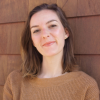
What a poet taught me about sitting still
Building a mindfulness practice into a busy grad student schedule
One year ago or so, many of us found ourselves suddenly with more time that we ever knew we had. With no commute, no social engagements, and little to do outside the house, we were left alone with ourselves. Perhaps for the first time, or at least, for me, for the first time in a long time.
Naturally I poured new activities into the gaps in my schedule—buried pinprick seeds in soil, hid them in the closet, and waited for them to bear their spring-green heads. I baked bread, and muffins and other things. I rearranged my furniture, and walked in rippling loops around my house. The evening hours passed with my friends in boxes on a screen, where at least we could be alone together. (If you drink on Zoom, are you drinking alone? I’m still not sure.)
It’s funny, isn’t it, how we feel called to be busy all of the time? In school, and then in life after school, and on weekends between our work? Am I the only one who wakes and wonders immediately how I will fill my days? This is quite the habit to be in–with what was I filling my time?
Then, stuck inside on a rainy day I finally reached for a library book I’d nestled on my shelf, New and Selected Poems, I’d long intended to read but had been too busy. (“Too busy.”) The words on those pages changed my mind about time.
Mary Oliver is a poet with a lot to say about how we spend our waking hours. She does not opine so much as observe, and her observations hit me squarely between the eyes. Steeped as I was in conversations in business school about Mindfulness and Leadership and the purpose of a corporation, I was spending my newfound time on what was essentially a collection of meaningless activities. Where was the disconnect? And if I was not thoughtful about how I was spending my own life, how could I possibly hope to imbue meaning and values into any goliath corporate setting?
To be fair, I first learned about Mary Oliver years ago from a yoga teacher of mine who often quotes her well-known “Wild Geese”, and so I suppose as my teacher’s teacher, she’s been schooling me for some time. But her famed question in Summer’s Day—“What is it you plan to do with your one wild and precious life?”—is so commonly quoted in commencement speeches and other contrived settings, when I learned that she wrote this poem as a poetry exercise, I must admit I became a bit jaded. I put her books down, and returned to her words only slowly, almost by chance: as I’d searched the spines of books in the dusty library during my first semester, my finger came to rest upon this book serendipitously, for it was not the book I’d come to find. Still, on a whim, I’d pulled it down and carried it home with me.
In the time between when I first discovered her and the grey day that I finally returned to her poems, I’d missed so much. She offers many lessons on life, which I’d forgotten but was suddenly eating up several times a week, and will spend a lifetime digesting.
Here’s one that sticks with me:
“What are we sure of? Happiness isn’t a town on a map, or an early arrival, or a job well done, but good work ongoing.” (Work, Sometimes)
And another: “To pay attention, this is our endless and proper work.” (Yes! No!)
Her pages overflow with stories of animals going about their short lives alongside our own lives full of hubbub. She tells of black bears, herons, and a moose in New Hampshire. How was it that, in the same wild of the northeast, she saw so much that had passed me by?
In short—I was not looking. She told me to open my eyes. To pay attention. To let go of the grip of calendar holds and focus on the daily work of being part of the world around me.
Like my professors at MIT, Mary Oliver is a teacher to me. I do not know her, of course, but she taught me just as well as the teachers I met with daily online. Unlike many of the others, she skips the formalities and cuts straight to a fundamentally core curriculum: what will you do with your life? Trite as it may be, I must admit now, on the eve of my graduation, that it’s actually quite a good question. And her poems read like a manual for finding our answers.
I use her questions as guides, things to turn over in my mind as I journal or take time to meditate. The images she creates and questions she offers are a focal point–a sharp reminder for me to plan my days so that I do not wander aimlessly, but rather tie my actions to the bigger things I find to be essentially important. What am I sure of? As I meander through each day, am I lost in thought, or am I paying attention? And as we gently transition towards normalcy and my calendar becomes blocked full, she’s called me to find time to observe the world around me–to follow the blue jays that jump from branch to branch outside my window, or listen to the cardinal that sings from high in a tree. A reminder I need not be doing things in order to feel accomplished, happy, or at peace. I can sit still, in my place in “the family of things”.
This week my long string of renewals will come to an end and I finally will return New and Selected Poems to its rightful home on MIT’s shelves. I urge you, check it out.
Share this post:
